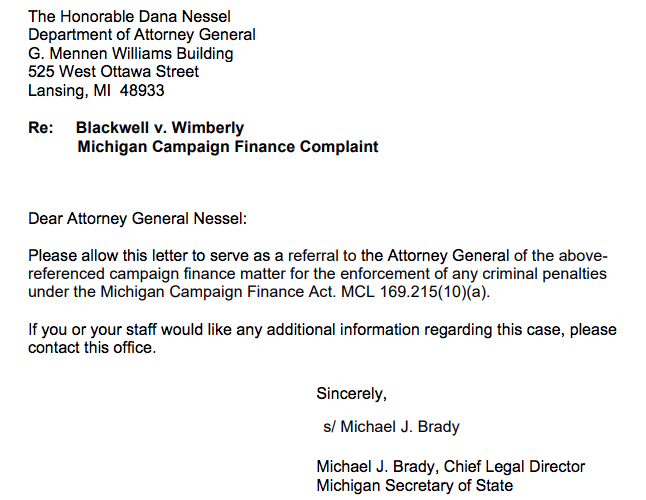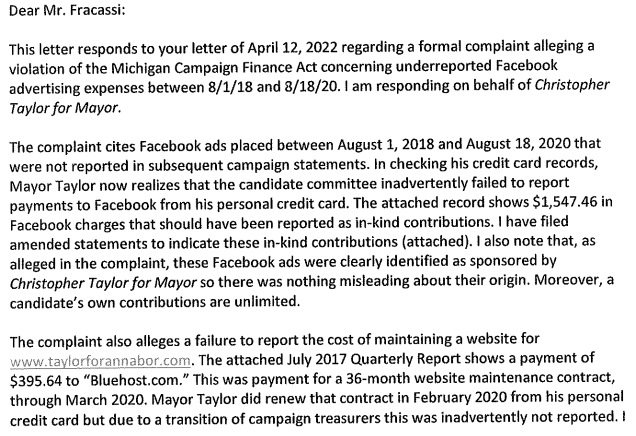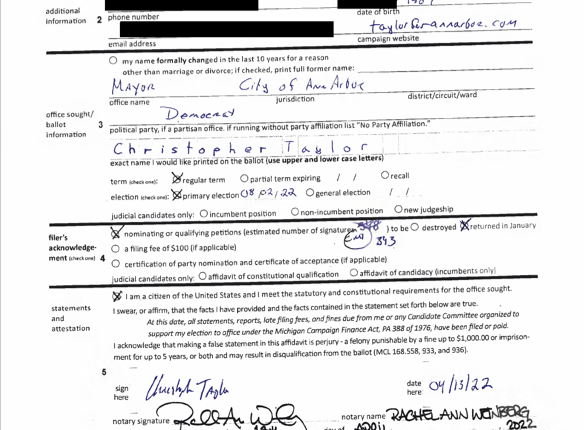Mayor Violated Michigan Campaign Finance Act; Did He Also Perjure Himself?
by P.D. Lesko
9/8/22: Updated with comments from the Michigan Department of State and Washtenaw County Clerk Larry Kestenbaum.
The Michigan Secretary of State’s Elections Bureau received a complaint in March 2021 that alleged Ann Arbor Mayor Christopher Taylor violated Michigan’s Campaign Finance Act. On Aug. 22, 2022, the complaint filed by an Ann Arbor resident was determined by the Michigan Secretary of State’s Elections Bureau to have been valid. No fine or sanction was imposed on Taylor. However, how the complaint was handled by the Michigan Secretary of State’s Elections Bureau and its staffer Adam Fracassi has led to questions by the complainant and local elected officials. One Ann Arbor Council member questioned the legality of the Elections Bureau’s actions leading up to the Aug. 22 determination.
Council member Elizabeth Nelson (D-Ward 4) said in an email: “I have more questions about why the Secretary of State did not follow its own timelines and procedures when a candidate failed to respond to a complaint of this sort. Campaign finance law may be the only circumstance where transparency and accountability are legally required of political candidates. Michigan’s campaign finance law is notoriously weak already and this case highlights that even existing law can and will be set aside selectively or arbitrarily.”
A Tale of Two Campaign Finance Complaints: Black Mayor, White Mayor, Different Outcomes
On May 24, 2021, long-time Michigan Elections Bureau Election Law Specialist named Adam Fracassi sent Ann Arbor’s Mayor Taylor a notice about campaign finance allegations (about three months after the complaint was filed). Fracassi sent the notice to the address of Taylor’s treasurer of record, former County Commissioner Leah Gunn. The notice gave Taylor 15 days to respond. He failed to do so.

Public records suggest Taylor may have also been sent a second notice on January 26, 2022.
Public records show that on April 27, 2021, the Secretary of State’s Bureau of Elections received a similar complaint (undeclared expenditures, missing reports) against a Wayne County candidate named Patrick Wimberly. Wimberly is the Mayor of Inkster. Like Taylor, Wimberly did not respond to his May 24, 2021 notice about alleged campaign finance violations sent by Adam Fracassi.
Here’s where the paths of these two campaign finance complaints, filed around the same time and adjudicated by the same Michigan Elections Bureau official, inexplicably diverge.
On October 6, 2021, public records show Mayor Wimberly was sent a FINAL NOTICE by Fracassi. Taylor was sent no final notice.
In Wimberly’s FINAL NOTICE, Fracassi warned Inkster’s mayor that his “failure to submit a written response to this final notice will leave the Department no alternative but to make its determination based solely on the documentation furnished by Mr. Blackwell [the complainant].”
On Nov. 30, 2021, Fracassi sent Mayor Wimberly a letter by certified mail in which Fracassi adjudicated the complaint in favor of the complainant. Fracassi wrote Wimberly, “If the violation cannot be corrected through the conciliation process within 90 business days of this notice, the Department is required to either commence a civil hearing or refer the outstanding case to the Attorney General for criminal prosecution. Id. Please contact the undersigned at fracassia@michigan.gov to discuss a resolution to this matter.”
In June 2022 Michael J. Brady, Chief Legal Director of the office of the Michigan Secretary of State, referred the complaint against Patrick Wimberly the the Michigan Attorney General for prosecution.

Taylor, like Wimberly, never responded to his May 24, 2021 notice, but the complaint against Taylor was not summarily decided against him by default by Adam Fracassi. Rather, eleven months after the first notice was sent, Fracassi sent Taylor a second “courtesy” notice—a do over. The first page of that notice is dated April 12, 2022; page two is dated January 26, 2022.
An examination of all of the campaign finance resolutions posted to the Bureau of Elections website going back to 2012, shows that Taylor’s “April 12, 2022” letter is the only one with different dates on the cover page and page two. All are signed by Fracassi, and the now Election Administration Manager Lori Bourbonais.
“I’m very troubled if, in fact, the Secretary of State’s Elections Bureau applied different standards between Inkster’s mayor and Ann Arbor’s based on race,” said Kathy Griswold (D-Ward 2). “Racial equity is critical. Our County Clerk needs to make sure everything about the upcoming November general election is done according to the book and that includes whether Taylor should be disqualified. I’d hate to see Larry [Kestenbaum] charged with a crime, but it’s not a secret that he’s afraid of the local political machine.”
The Ann Arbor Independent asked Michigan Secretary of State Jocelyn Benson if she intends to investigate the discrepancies in the handling and adjudication of the campaign finance complaints against Taylor and Wimberly. The A2Indy also reached out to Adam Fracassi for an explanation of the discrepancies in his handling of the complaints lodged against the two mayors. MDOS spokesman Jake Rollow sent a statement via email:
As demands on the Bureau of Elections have increased in recent years, and it has received a large volume of campaign finance complaints and FOIA requests, the practical reality is that at times the bureau must consider staffing capacity and resources when prioritizing workloads, complaints and responses. The bureau continues to meet its obligations to act in a nonpartisan and unbiased manner within current constraints.
Patrick Wimberly did not respond to the first or second notice sent to him by the bureau, and was therefore sent a final determination letter notifying him that the bureau may have reason to believe he had committed a Campaign Finance Act violation and seeking to enter into a conciliation agreement. When he did not respond, the matter was referred to the Attorney General.
The Washtenaw County Clerk
County Clerk Lawrence (Larry) Kestenbaum was elected in 2004. He served as a county commissioner in Ingham County, Michigan (1983–88) and Washtenaw County, Michigan (2000–02). Campaign finance records show that since his election in 2004, Kestenbaum has issued himself eight late filing fee, error and omission and late filing fee credit letters. Most recently, on July 26, 2022 Kestenbaum was issued a late filing fee notice and an error/omission letter. He still owes a $25 fine assessed him for filing his July 2022 campaign disclosure one day late.
The Washtenaw County Clerk was asked to disqualify Taylor from appearing on the Aug. 2022 primary election ballot. On May 22, 2022 Ward 1 resident and former Council candidate Eric Sturgis, the resident who’d submitted the March 2021 campaign finance complaint against Taylor, sent a formal request to the County Clerk to disqualify Taylor from running for re-election. Sturgis wrote:
“Mayor Christopher Taylor filed to run for Mayor of Ann Arbor and was certified on April 13th, 2022. There was still this pending campaign finance issue [the Facebook ad spending omissions] yet to be resolved, and then on April 26th, 2022 after the FILING deadline the Christopher Taylor for Mayor Campaign filed an amended CFR [campaign finance report] that addressed some of my complaints, and again on May 6th, 2022. As you are probably aware I believe he had to sign an Affidavit certifying that he had no unresolved campaign finance issues; this was not true….I believe that you need to look into whether candidate Christopher Taylor needs to be removed from the ballot…”
Michigan Election law is clear: MCL 168.558 (4) states, “An officer shall not certify to the board of election commissioners the name of a candidate who fails to comply with this section, or the name of a candidate who executes an affidavit of identity that contains a false statement with regard to any information or statement required under this section.”
In response to Sturgis’s May 22, 2022 written request to disqualify Taylor from running in the August 2022 primary election, the County Clerk’s office consulted the Elections Bureau.
The A2Indy filed a Freedom of Information Act request in June 2022 to obtain emails sent between Elections Bureau officials, Kestenbaum and Mayor Taylor on May 23, 2022, the day after Sturgis asked Kestenbaum to disqualify Taylor.
The FOIA fee estimate provided by Adam Fracassi stated that officials in his office would need three hours to gather together all of the responsive emails. Fracassi then assessed an hourly rate of $82 as the hourly pay of the lowest paid employee in the Michigan Secretary of State Department capable of doing the work. That hourly rate works out to an annual salary of $159,900. A2Indy appealed Fracassi’s fee assessment. The hourly rate to search and gather together emails from Kestenbaum and Taylor to Elections Bureau officials sent on May 23, 2022 was lowered to $56 per hour, equal to an annual salary of $112,000.
It’s not clear whether Fracassi or anyone else in the Elections Bureau apprised Kestenbaum of the May 24, 2021 campaign finance violation notice that had been sent to Taylor. According to Michigan election law, that unanswered notice of violation, alone, would have been grounds for Kestenbaum to have disqualified Taylor from running in the August 2022 primary election. In the end, Kestenbaum declined to do so based on the fact that Taylor’s alleged campaign finance violations were “still under review” at the time of Sturgis’s May 2022 request.
Public records show that the window of time Taylor had to respond to Sturgis’s allegations had, in fact, closed 15 days after Fracassi sent the May 24, 2021 notice to Taylor’s treasurer of record.
Kestenbaum was contacted by email for a comment. In an email, he reiterated that his decision had been based on the fact that when asked to remove Taylor from the ballot, the MDOS had not yet adjudicated the complaint.
The handling of Sturgis’s complaint aside, Taylor now faces another, more serious problem.
Perjury
Michigan’s Campaign Finance Act requires candidates for elected office to have their campaign finances in order before filing to run. Candidates sign an Affidavit of Identity in which they swear that “as of the date of the affidavit, all statements, reports, late filing fees, and fines required of the candidate or any candidate committee organized to support the candidate’s election under the Michigan campaign finance act … have been filed or paid.” Election Law also states that “An officer shall not certify … the name of a candidate who executes an affidavit of identity that contains a false statement.”

There are concerns that Taylor, a lawyer, may have perjured himself on his Affidavit of Identity. Should this allegation be substantiated, Ann Arbor’s mayor could find himself disqualified from appearing on the November 2022 general election ballot, and hauled in front of the Michigan Bar Association with his license to practice law on the line.
Taylor did not respond to Sturgis’s allegations until April 26, 2022, more than 300 days after the complaint was filed, and 11 months after Fracassi’s May 24, 2021 letter was sent to Taylor’s treasurer of record, Leah Gunn.
Candidates are legally responsible for making certain campaign contact information is up to date: The Michigan Campaign Finance Act, MCL 169.224 Sec. 24 (4) states: “If any of the information required in a statement of organization is changed, the committee shall file an amendment when the next campaign statement is required to be filed.”
An official with Michigan Attorney General’s office said in an email that, legally, Taylor was “properly notified” of the campaign finance allegations by the Elections Bureau in Fracassi’s May 2021 notification.
Three hundred days after the May 24, 2021 letter was sent to Taylor’s campaign, Adam Fracassi, “as a courtesy,” sent out a second letter to Taylor’s new treasurer of record (former Ward 2 Council member and lawyer, Joan Lowenstein) dated April 12, 2022. [The second page of that April 12 letter is dated January 26, 2022.]
Despite having been properly apprised of campaign finance allegations and neglecting to respond, on April 13, 2022, in order to submit his nominating petitions to run for re-election, Christopher Taylor signed a legal affidavit in which he swore that his campaign finances were in proper order. A violation of the terms set forth in the Affidavit of Identity constitutes perjury, a felony punishable by up to five years in prison and/or up to a $1,000 fine and may result in disqualification, according to the form.
Council member Nelson said, “If the SOS had acted appropriately, the whole of this issue should have been completely resolved well before 2022 candidate affidavits were even submitted….Why [did] the SOS not follow proper procedure for this particular candidate and what additional communication happened in the eleven months between the initial complaint and the followup letter? If – as is suggested by the documents posted online – additional notice was sent 1/26/22, then the candidate [Taylor] did potentially file a false affidavit.”
Former Ward 1 Council member Anne Bannister ran against Taylor in the August 2022 mayoral primary election. She said in an email, “What took the SOS, Bureau of Election, and AG’s office so long to investigate and enforce the appropriate fines and consequences?”
It’s a good question, particularly since public records show that the Bureau of Elections (Fracassi) had ruled against Inkster Mayor Wimbley seven months from the date of the campaign finance violation filed against him.
On May 15, 2022, Michigan Secretary of State Jocelyn Benson released a list of candidates for office whom she had disqualified for a variety of reasons. Fifteen contenders for office were among those on Benson’s list, including Michigan State Senator Betty Alexander, D-Detroit. Alexander was among 11 candidates the State Department said made false statements about complying with the Michigan Campaign Finance Act. Alexander, a Black woman, was disqualified from running for re-election in the 6th state Senate district.
Taylor Admits Violating the Michigan Campaign Finance Act: No Fines Assessed
When placing multiple campaign Facebook ads, Lowenstein told Adam Fracassi in an April 26, 2022 letter, Taylor had mistakenly used his personal credit card. Those expenses, Lowenstein wrote, had mistakenly been omitted from required campaign finance disclosures going back to 2018. Thus, on April 13, 2022, the day he signed his Affidavit of Identity, Christopher Taylor’s campaign finances were not in order. All of Taylor’s 11 amended statements were filed with the County Clerk’s office after the April 14, 2022 filing deadline to run for office.

Council member Nelson pointed out in her email that Lowenstein’s rebuttal, above, “to this complaint offers no extenuating circumstances to explain why this change in treasurer was an actual obstacle to receiving information from the SOS office.”
Local candidates who made errors or omissions in their campaign finance statements during the August 2022 primary election were, according to campaign finance records, given two weeks to make corrections. Failure to do so, according to one letter sent out by County Clerk Larry Kestenbaum, would result in having the matter referred to the Michigan Attorney General. One former Ward 1 City Council candidate, Michelle Hughes, in August 2021 paid a late filing fee of $4,976.47. Hughes had failed to file campaign finance disclosures going back to 2018. In October of 2021, Council member Travis Radina filed his campaign finance disclosure one day late. Kestenbaum fined Radina $25.
Taylor’s campaign finances are still not in order. The County Clerk has yet to levy the legally required fines and/or fees for the campaign finance omissions going back four years. Taylor has yet to pay those fines.
If Taylor falsified his Affidavit of Identity, that could land him in hot water with the Michigan Bar Association. He is already facing a formal grievance for unprofessional conduct. In Feb. 2022, former Ann Arbor City Attorney Bruce Laidlaw sent an email to Taylor and former City Attorney Stephen Postema. In that email, Laidlaw alleged that both men had engaged in “unprofessional conduct” related to the August 2021 forced resignation of former City Administrator Tom Crawford.
“I intend to file a grievance with the State Bar,” wrote Laidlaw. That grievance was filed. In April 2022, Crawford’s attorney sent the Mayor and City Council a demand letter requesting they retract allegedly defamatory statements made in public concerning Crawford’s forced resignation. The City of Ann Arbor has retained a legal firm to defend both Taylor and Postema.
The State’s Aug. 22 determination letter combined with the Affidavit of Identity signed after the State’s May 2021, January 2022 and April 12, 2022 letters alerting Taylor to (then) alleged violations of the Michigan Campaign Finance Act, may result in yet another request to disqualify the Mayor from running for re-election.
Ward 4 resident Eric Lipson (I) is running against Taylor in the Nov. 2022 general election. Lipson is a lawyer and, when asked if Taylor should be disqualified by the County Clerk, said, “Michigan AG Dana Nessel should investigate the actions of the Elections Bureau. Of course Taylor should be removed from the ballot. But at this point, I don’t know that I have the bandwidth to sue and run a campaign. Anne Bannister would have standing to sue and she should.” Lipson added, “There is some speculation that [County Clerk] Kestenbaum ruled the way he did in May 2022, because he was intimidated by the Taylor machine, afraid that they would run someone against him.”
When asked to comment, Eric Sturgis said: “I will be making a formal request [to remove Taylor from the November 2022 general election ballot] with the County Clerk’s office in the coming days. This behavior is not acceptable.”
Christopher Taylor did not return an email requesting a comment.


Comments are closed, but trackbacks and pingbacks are open.